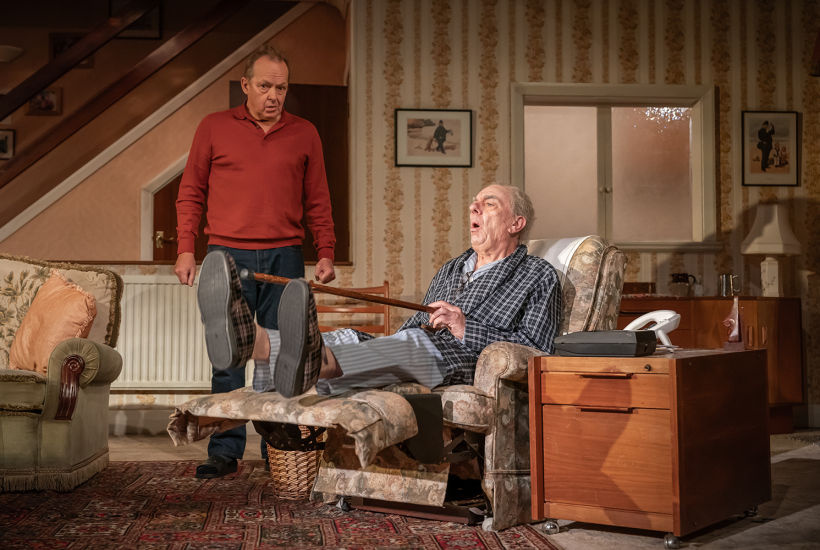To Have And To Hold boasts a starry cast and a top-class creative team. Richard Bean’s script is a meditation on ageing, directed by Richard Wilson and Terry Johnson, and it opens with a sight-gag about a wonky stairlift descending into a suburban lounge in Yorkshire. The stairlift is occupied by Flo, a tea-drinking fusspot (charmingly played by Marion Bailey), who looks after her crumbling husband, Jack. Both have endured 70 years of marital bliss and are slithering gently into the grave. Flo gets help from her middle-aged son Rob and his sister Tina, but they’re zestless, bland personalities.
If a gag fails it returns again with the same result: sparse laughter
The frivolous script abounds in repetitive jokes about locked doors, missing keys, verbal misunderstandings and a telephone extension that rings in two places at once. If a gag fails, it returns again and again with the same result: sparse laughter. The dim-wittedness of the older folks inspires more comic moments about memory loss and airbags in cars being activated by an on-off switch. Is anyone thick enough to believe that?
The play desperately needs conflict but the characters are far too friendly towards their relatives and their neighbours. The only figure with a clear aim is Jack, who longs to die. What if he fails and continues to live? Nothing will change. This show is like watching a broken kettle boil itself dry. A minor whodunnit develops when Rob and Tina discover that a helper from the village has purloined modest sums of cash from their parents’ bank account. The chief suspects are the man who trims the hedges and the woman who wipes Jack’s bottom – but neither stands to lose much if their embezzlement is discovered.
The script is padded out with solo speeches from Jack, a former police officer, who enjoys recording the highlights of his career on a stack of cassettes that aren’t labelled properly. Now, let’s see. Will these tapes get lost at a crucial moment? They just might. The characters are perfectly pleasant and the performances are enjoyable but that’s not enough. This is a show about the tedium of life that suffers from the vice it seeks to mock. One can’t help suspecting that the three elderly creatives weren’t trying properly. Bean, Wilson and Johnson have at least 100 years of comedy experience between them and they’ve forgotten every lesson they ever learned.
But their play feels like an instalment of Mission: Impossible in comparison with Clyde’s, by Lynn Nottage, a writer of American soaps. This wordy, foul-mouthed melodrama is set in a road-side canteen where all the staff are crooks on parole. They bicker and bully each other with the encouragement of the ghastly manageress, Clyde, who is herself a convict released before her time. Despite being the tiniest person in the kitchen, Clyde enjoys humiliating and physically thrashing the male workers who seem incapable of defending themselves. If they complain, she threatens to have them sent back to jail.
Her kitchen is run with a flagrant and deliberate contempt for hygiene. The meat stinks. The staff drink beer and smoke cigarettes constantly. They use the worktops as seats and they wipe their rancid hands on filthy aprons. And yet they hope to receive a favourable review from the restaurant critic of a local freesheet. Meanwhile they jabber non-stop about their law-breaking exploits.
Letitia, a single mother, used her sick child as a human shield while pilfering costly drugs from a pharmacy. One of the chefs robbed a bank with a pellet-gun hoping to raise $1,500 to buy a pedigree King Charles spaniel. Another went to jail rather than testify against a corrupt banker who planted narcotics on his brother. These stories don’t make much sense, but the real problem is that they impede the narrative instead of moving it forward.
Trainee dramatists are warned against letting characters reminisce about events that don’t affect the action on stage. And any writing tutor could have told Nottage that she hasn’t created a drama at all. This is a collection of soliloquies spoken by characters who share a workplace, but not a storyline.
It’s a show about the tedium of life that suffers from the vice it seeks to mock
The only unusual figure, Montrellous, is a pretentious motormouth who talks about junk food like a literary critic or an architectural historian. He makes burgers with ‘balance’ and ‘elevation’, he says. He mentions ‘intangible grace’ and ‘sacred experiences’ in relation to mincemeat. But he’s supposed to be a hardened criminal working alongside violent ex-convicts. So why does he talk like a fey little popsicle dreamed up by a newcomer at the village writers’ group? Very odd.
What the play really needs is action and movement. And finally, after 80 minutes, something happens. A row erupts that leads to a reconciliation and a hug. Then everything settles back to normal. If you fancy spending two hours watching a crew of deadbeat criminals yelling and swearing, this is the show for you.
Got something to add? Join the discussion and comment below.
Get 10 issues for just $10
Subscribe to The Spectator Australia today for the next 10 magazine issues, plus full online access, for just $10.
You might disagree with half of it, but you’ll enjoy reading all of it. Try your first month for free, then just $2 a week for the remainder of your first year.








Comments
Don't miss out
Join the conversation with other Spectator Australia readers. Subscribe to leave a comment.
SUBSCRIBEAlready a subscriber? Log in